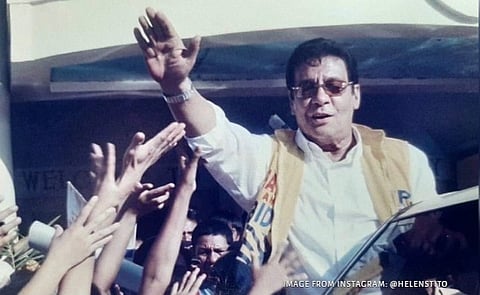
- NEWS
- the EDIT
- COMMENTARY
- BUSINESS
- LIFE
- SHOW
- ACTION
- GLOBAL GOALS
- SNAPS
- DYARYO TIRADA
- MORE

In the Philippines, the line between showbiz and politics is often thin, with many beloved celebrities trading scripts for speeches, hoping to translate star power into public service. But while fame can open doors, it doesn’t always guarantee victory at the ballot box. Over the years, several high-profile stars have stepped into the political arena — only to walk away with a loss. Here are some of the most prominent names in entertainment who experienced political defeat:
In 2004, legendary actor Fernando Poe Jr., fondly known as FPJ, launched a highly-anticipated presidential bid under the Koalisyon ng Nagkakaisang Pilipino (KNP). Backed by the masses he often portrayed and defended in his films, FPJ’s candidacy was seen by many as a beacon of hope for the poor. His decision to run was influenced by his close friend and former President Joseph Estrada and a rousing show of public support during a massive rally at the Cuneta Astrodome.
Despite his enormous popularity and iconic status, Poe lost to incumbent President Gloria Macapagal Arroyo in a controversial and disputed election. He passed away later that year, leaving behind a legacy of cinematic heroism and a “what could have been” in Philippine politics.
Heartthrob Aga Muhlach took a shot at a congressional seat in Camarines Sur’s 4th district during the 2013 elections under the Liberal Party. Despite his nationwide popularity and clean image, he lost to Felix William “Wimpy” Fuentebella, scion of a long-standing political dynasty, by a slim margin of about 3,000 votes.
Muhlach contested the results, citing irregularities such as vote buying and ballot tampering, but eventually agreed to drop the case. His foray into politics remains a one-time effort, proving that charm alone isn’t enough to win in a traditional political landscape.
Best-known for his role as “Sir Chief” on television, Richard Yap entered politics in 2019, running for Representative of Cebu City’s north district under BARUG-PDP–Laban. He placed second, losing to incumbent Raul del Mar. Undeterred, he tried again in 2022 under the National Unity Party — but again failed to secure the seat.
Despite his crossover appeal and strong fanbase, Yap’s back-to-back losses underscore the difficulty of establishing political traction — even with celebrity recognition.
In 2001, National Artist for Film and Broadcast Arts Nora Aunor entered the political scene by running for Governor of Camarines Sur. Initially backed by Aksyon Demokratiko and later by the Arroyo-led Lakas–CMD, Aunor’s campaign was marked by drama — including a withdrawal of support from leftist group Bayan Muna and a shooting incident at her campaign headquarters.
Facing political titan Luis Villafuerte, Aunor was defeated in the gubernatorial race. More than two decades later, she reentered politics in 2024 as a party-list nominee for the 2025 elections. But by March 2025, she withdrew her candidacy, choosing instead to endorse another political group.
These losses show that while celebrity status can create buzz and bolster name recall, it’s no substitute for grassroots machinery, political experience and a solid platform. In a country where politics is often shaped by dynasties and deep-rooted networks, even icons can face uphill battles.
Still, for these stars, stepping into the political arena was more than a campaign — it was a public declaration of their desire to serve. And for their fans, that alone is a statement worth recognizing.
